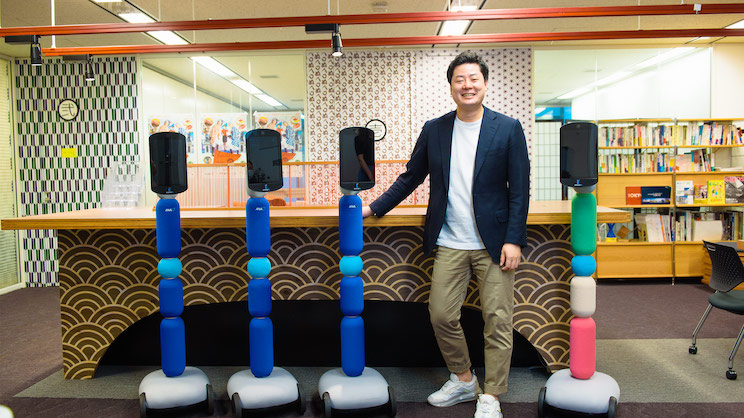The fourth generation’s continued challenge in a town of clothing wholesalers. Updating the family business through the Creative x Community.
The fourth generation’s continued challenge in a town of clothing wholesalers. Updating the family business through the Creative x Community.

Nihonbashi-Yokoyamacho and Nihonbashi-Bakurocho, both located in the northern area of Nihonbashi, has long been known as a town of textile wholesalers with many stores side-by-side that offer clothing and handcraft goods. Mr. Yuta Takeda, born to be the fourth head of “Marutaya,” a clothing wholesaler founded in this area, has led a life that promised him to be heir to the company since from an early age. After graduating from university and spending time working at a consulting firm, at the age of 30 Mr. Takeda took it upon himself to reform a subsidiary of Marutaya, wherein he has expanded not only the traditional wholesale business, but also into share-office and hotel management and other ventures within this town. We listened in to the key person who has continued to be energetic and active in this town, with the key words being Creative, Fashion, and Community.
A life destined to be heir apparent.
―First of all, please provide us a background about yourself Mr. Takeda.
The area of Nihonbashi-Yokoyamacho have long had a concentration of clothing wholesalers that rivaled that of Osaka’s Senba district. I was born as the fourth head of Marutaya, a wholesaler that had been in operation for close to 70 years in this area. The founder was my great‐grandmother, but since my grandmother was an only child and she married my grandfather, who was a doctor from Osaka, the head manager at the time managed the company after my great-grandmother. Furthermore, the next generation were three sisters, and when the second child who was my mother relocated to Tokyo and she met my father, he became the third head after he married into my mother’s family. Afterwards, since I was the first-born and only boy, with the other two children being both girls, I was pretty much expected to succeed the family company.
―Did you have any kind of rebellious feelings towards succeeding the family business?
Although I’ve always knew that I had to succeed the family from an early age, I still harbored some resistance and definitely had a rebellious phase during my youth. And I’ve kept those feelings throughout my life, but upon entering the workforce, I think I found meaning in being an heir and came to terms. In addition, while traveling the world as a backpacker, I started thinking that although this maybe not a life that I can freely choose to do what I want, it nonetheless does not mean it is worthless to do things that I should. Upon coming to this conclusion, that’s when I also came to terms with my life and started thinking positively from there on.

Mr. Yuta Takeda, head representative of “LOGS,” a subsidiary of Marutaya, of which is managed by his father.
―Did you immediately start working in the family company after graduating from university?
No. I started working for Accenture and was involved in consulting work. But I chose that line of work with the understanding that I would be succeeding the family, and even thought that way about university. I enrolled in the Economics Department of Keio University because I thought it will be beneficial if I were to become president one day. Although the parent company of Marutaya is still managed by my father, when I was 30, my father purchased the clothing wholesaler Newcaneno, including the entire building, where I since became responsible for its reformation.
Two new businesses, born from sensing impending danger towards the present.
―In regards to reforming a company, what exactly did you do?
Previously, the main job of clothing wholesalers involved the selling of clothing at wholesale prices to stores located in local shopping districts. But nowadays, it has become necessary to have dealings with larger retailers. So what we first took on was to prepare strong merchandises. We negotiated with a popular headwear brand in America at the time called “Newhattan,” and became their distributor in Japan. In addition, under the theme of involving designers and creators, we began managing share-offices, using our only weapon at the time, our real estate.
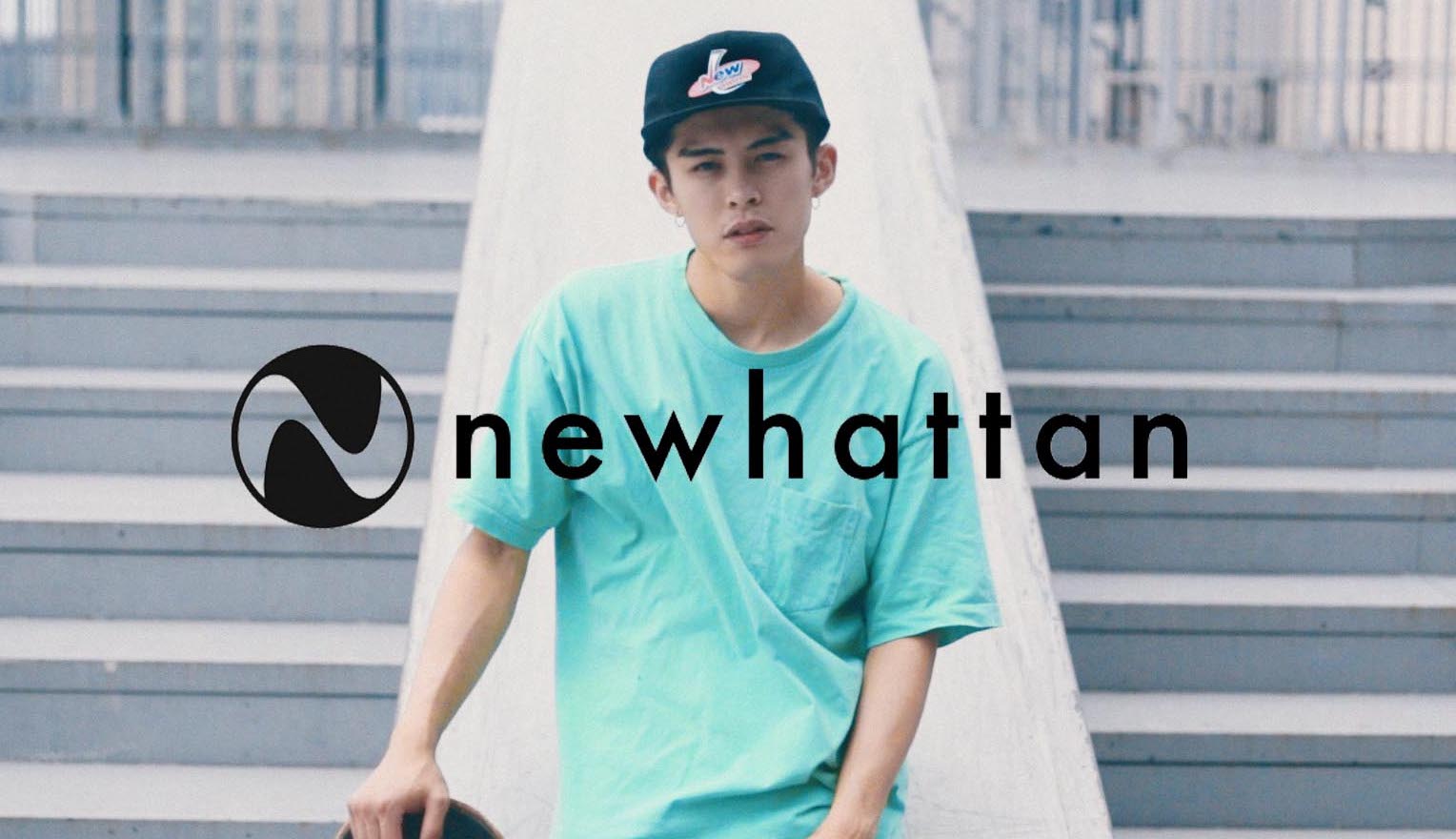
LOGS is the official distributor of Japan for “Newhattan,” an American headwear company established in New York. An instant success and popularity in Japan through collaborations with various brands and retail shops
―While we understand the reason for establishing a strong merchandise, what was your intent in involving creators?
When thinking about the future of logistics from the standpoint of a wholesaler, I felt that the key words were Creative and Community. Previously, products were in transaction through the market by way of various players. From upstream to downstream, it involved manufacturers, wholesalers, retailers, etc. But here on forth, through the merging of the Creative and Community, I think there are going to be more transactions that do not require the intervention of the market.
―When you say Community, what exactly do you mean?
A gathering of people with similar tastes and likes. For example, just like how a fan of ONE OK ROCK (Note: a Japanese rock band) would pour money into the merchandising of the band, a community centered on creators can be built with the logistical matters organized inside. And with the spread of these types of logistics that do not require a market, a middle-man such as a wholesaler would become obsolete. It was through this feeling of impending danger that we thought to connect the Creative with the Community on our own. When you look back on history, swordsmiths, potters, chefs, and any artisanal creators all had a community surrounding them, so if you wanted a certain type of sword or tea pottery, there was a gathering for like-minded tastes. In fact, I actually think that the Creative and Community had always been one and the same, and that the past hundred or two hundred years of our current economic model destroyed that unity.
―What type of management is employed for the share-office?
We began as a franchise of co-lab, with share-offices located throughout Tokyo. After we were taught the basic know-how from them, we started our own current operation. At the initial launch, since we couldn’t compete with other co-labs of Tokyo in terms of location, we approached schools to see if we could build a flow of people, and upon finding out about Mr. Yoshikazu Yamagata, a fashion designer through the net, we contacted him. Through this we were able to have a fashion school that he manages called “Koko-no-Gakko (School Right Here)” be located right here, and as such, were able to attract other creators and enterprises in the fashion industry to this share-office.
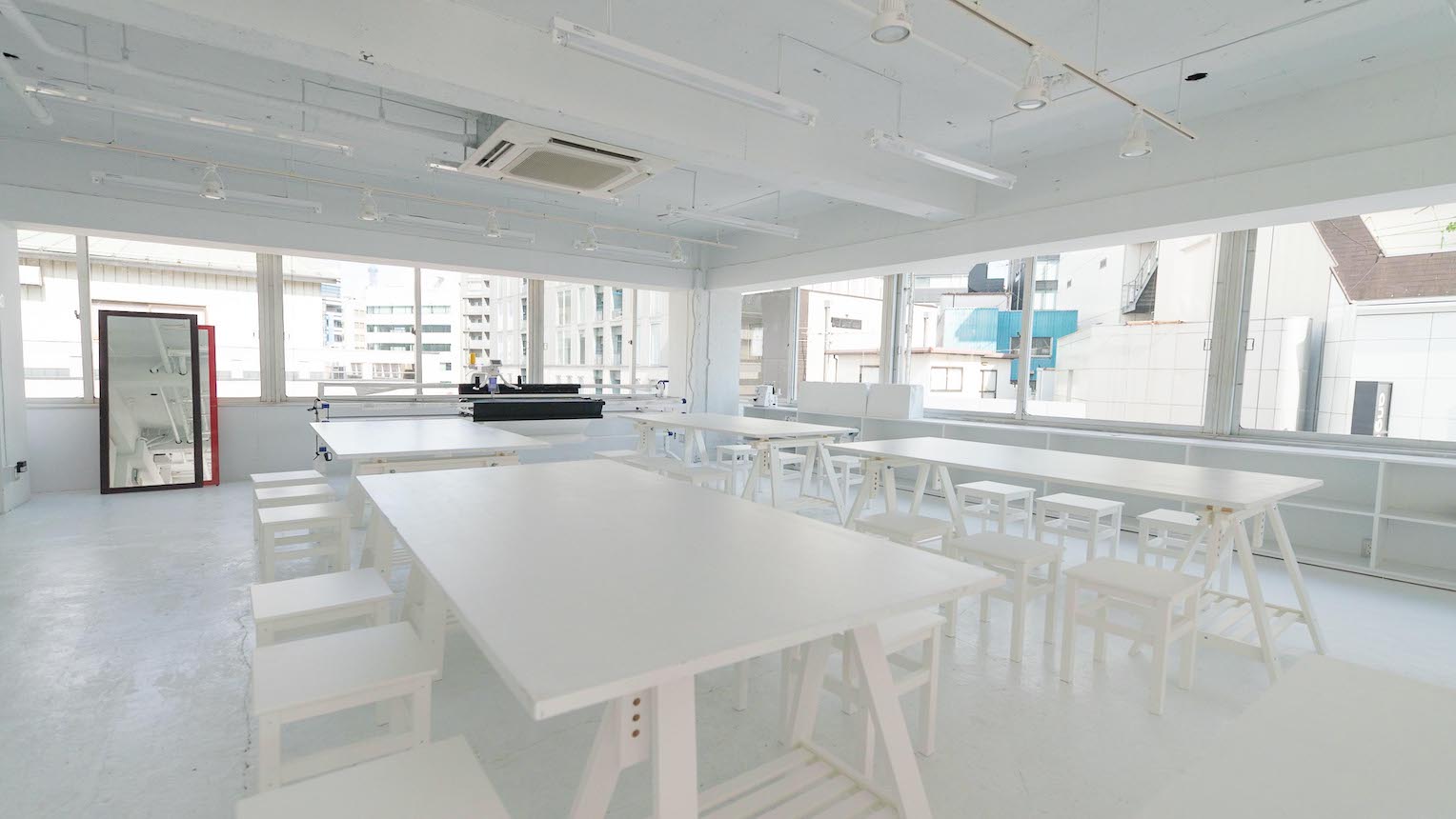
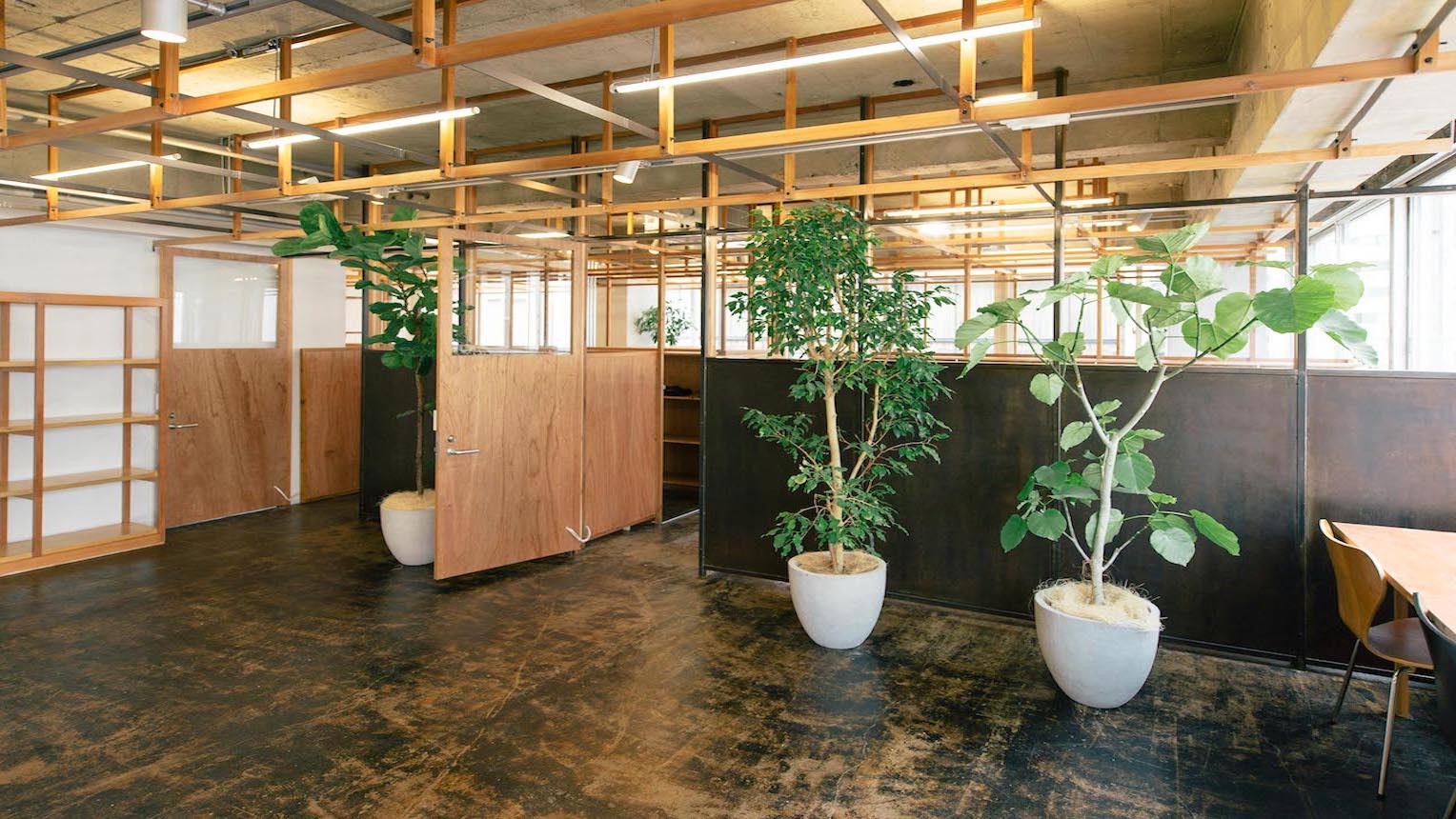
The share-office is operated on the 4th through 6th floors of the company building. The 1st through the 3rd floor is home to “Newcaneno,” the original cash-and-carry wholesaler of apparel goods
Fashion being about communicating “Likes.”
―For Mr. Takeda, what does fashion mean to you?
The reason I am involved in fashion is because my family owns a clothing wholesale store. During my time at Accenture I was involved in Healthcare, and the doctors who were involved in savings lives had strong sense of justice and mission in their work. Compare to that, when I first joined the fashion industry, I didn’t have the faintest idea about anything. In the fashion industry, I felt that all things were judged by two core factors, whether the clothing looked good and sold well. That’s it. Even if it were a time when mass media was still a thing, in this current time of diversification and various sense of values, trying to mobilize people under your own ideas and decisions is difficult. And to be honest, if we’re only going to be thinking about making money, there are better investments than clothing (laughs). When the Newhattan deal became a success and the company started moving forward, I could began to see myself succeeding the company. But this was where I hit a wall. I then started thinking “why am I even in the fashion industry?”

Marutaya’s HQ building, located in Higashi-Nihonbashi, near Nihonbashi-Yokoyamacho. In addition to the wholesale business, currently handles hotel management and the real estate business
―How were you able to overcome that wall?
In the fashion world there is a hierarchy of brands from international luxury products to affordable products for the masses that incorporates the essence of the luxury. Even in the food and dining industry, there are rating sites to place rankings. Under this kind of hierarchy, I see a polarization. Only the select few upper-class could purchase the luxury brands and go to expensive restaurants, while all others are left to consume average-homogenized goods. That is a pretty uninteresting world to me. But if there are two items, one priced at ¥10,000 while the other is priced at ¥100, and you can honestly say that you prefer the ¥100 priced item, no one can make fun of you. Right now, diversification is beginning to be touted and famed due to a growing realization by everyone that the hierarchy and absolute sense of value brought about by global capitalism does not make everyone happy. And I too began to realize that in such a time, fashion could make something be “Liked” or “Disliked,” and could point towards an alternative way of thinking.
―In that sense, fashion is not merely something as simple as just only clothing.
Once I started thinking that way I began various businesses. One of which is the DDD HOTEL, scheduled for the grand opening on October 1st. In addition to guest rooms, inside are a gallery to exhibit contemporary and street art, as well as a luxury French restaurant. Here, I only wanted and chose to highlight what I “Liked” without any fuss or reason. In addition, we plan on attracting a restaurant that serves foods made from insects nearby. But my understanding is that only about one in every ten people enjoys foods made from insects (laughs). But to me, I feel that highlighting these things is what fashion can do.
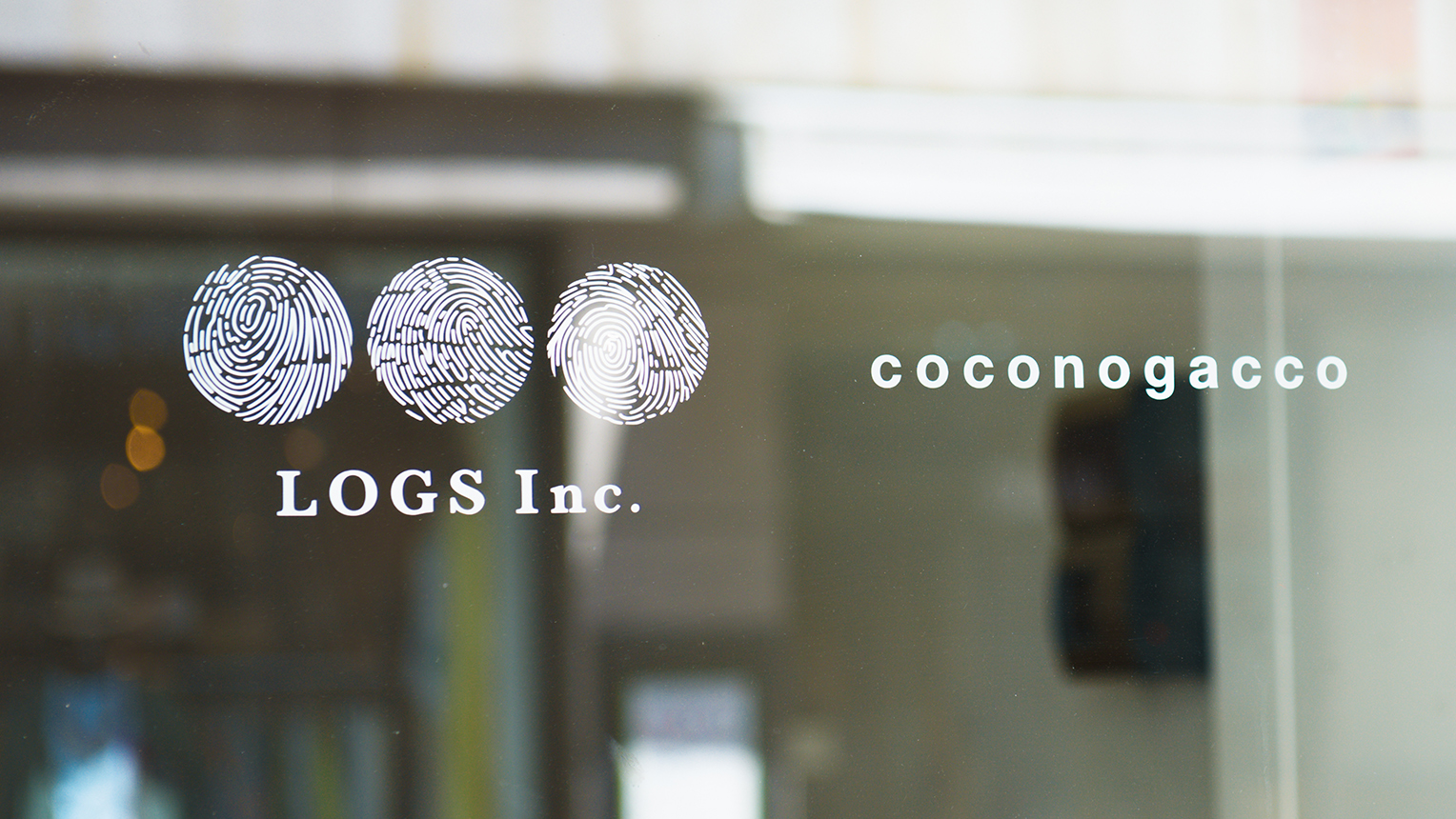
If I’m going to be seen as a rich kid, then I might as well be an altruistic one.
―I understand that through expanding the business you find more and more opportunities to meet creators. Has there been any sort of change that came about as a result?
Brilliant creators are incredibly interesting, and just their presence alone coming and going invigorates our employees. In addition, we were able to establish relations with clients who previously were not interested in “old-timey wholesalers.” We still have not been able to reach a point where business can be developed just by connecting the Creative and Community, but even though that is a major issue, at the very least I am enjoying the moment, and I actually feel my life is more enriching (laughs). Initially, I was only focused on gathering creators from a business perspective, but ultimately, I think I just enjoy their company (laughs). So nowadays, I sometimes even support what the creators wants to do and study alongside them, regardless of profitability or loss.
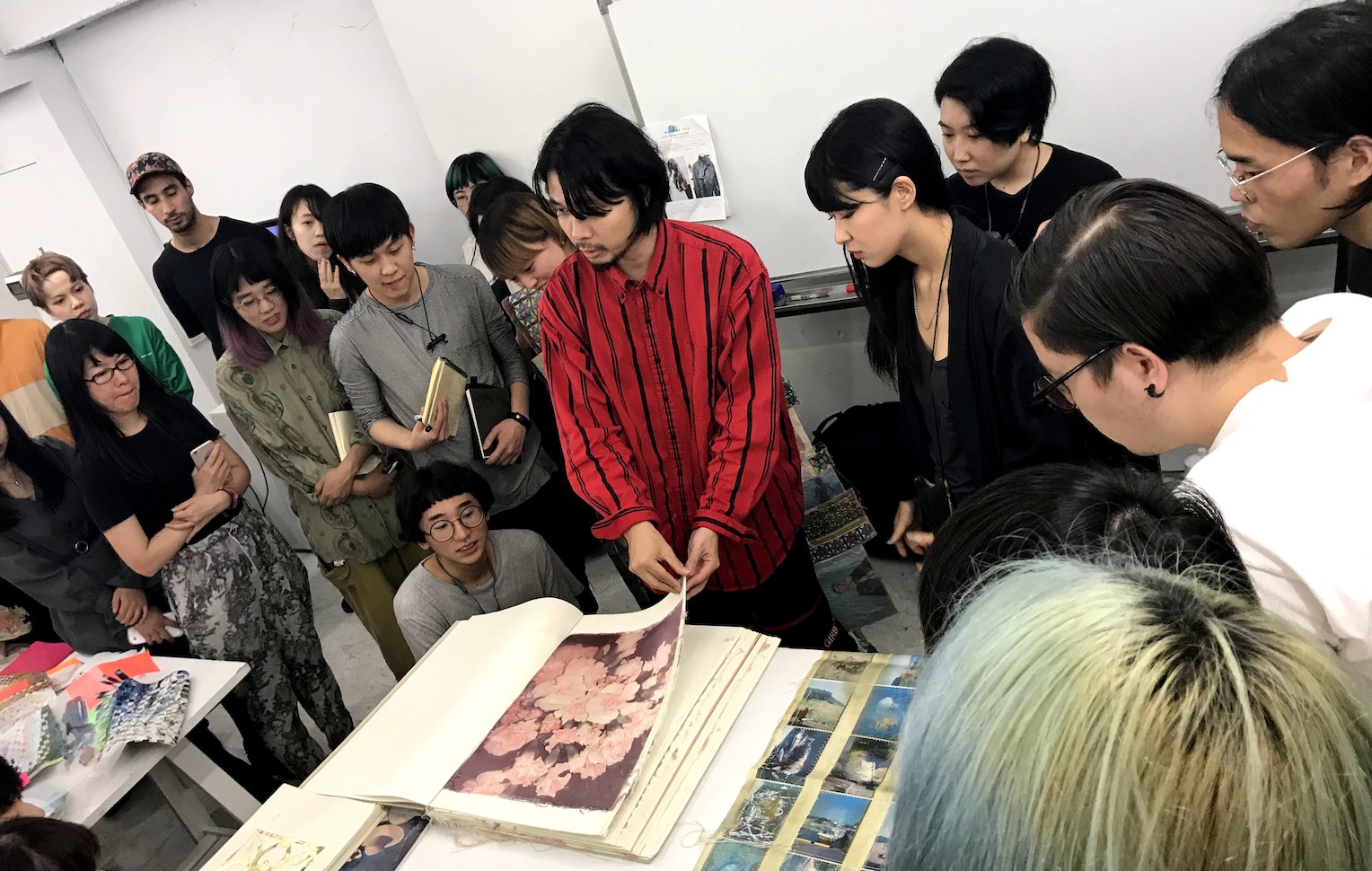
“Koko-no-Gakko” held at the share-office by Mr. Yoshikazu Yamagata, a fashion designer. Attracting considerable amount of attention from overseas, due to producing many prize-winners in international fashion contests
―What attracts you to creators?
I have somewhat of an inferiority complex about not choosing my own life and passion, so I have a great amount of respect towards people like them that have found something and strongly pursuing their goals. For example, the aforementioned insect food restaurant. When the owner initially approached me, the first thing he told me was, “I’ve ate all the insects you’ve seen your whole entire life.” So that was pretty trippy (laughs), and instead of going on about social issues regarding food losses, he was just really into insects. That’s it. I mean, there is no reason other than that. That is his passion and that is his truth.
―Mr. Takeda, you are starting to sound like a patron (laughs).
Yes, that is true. I’ve been called a patron before (laughs). But if there is something I can do, I think it’s best that I do it. Ever since I was a kid I’ve been told that “you’re lucky that you have a family to fall back on.” But that only made me absolutely not want to lose to anyone who ever said something like that. That’s why I traveled to 80 different countries and went looking for employment that did not give any thought to my upbringing. Of course, the reason I am able to be involved in various businesses is precisely because that I was well-off and that we had real estate and locality. But I strongly feel that is all the more reason to keep challenging. I’ve often joked that I’m “just a son of a wealthy family, but not just a rich kid” (laughs), but I might as well be an altruistic rich kid.
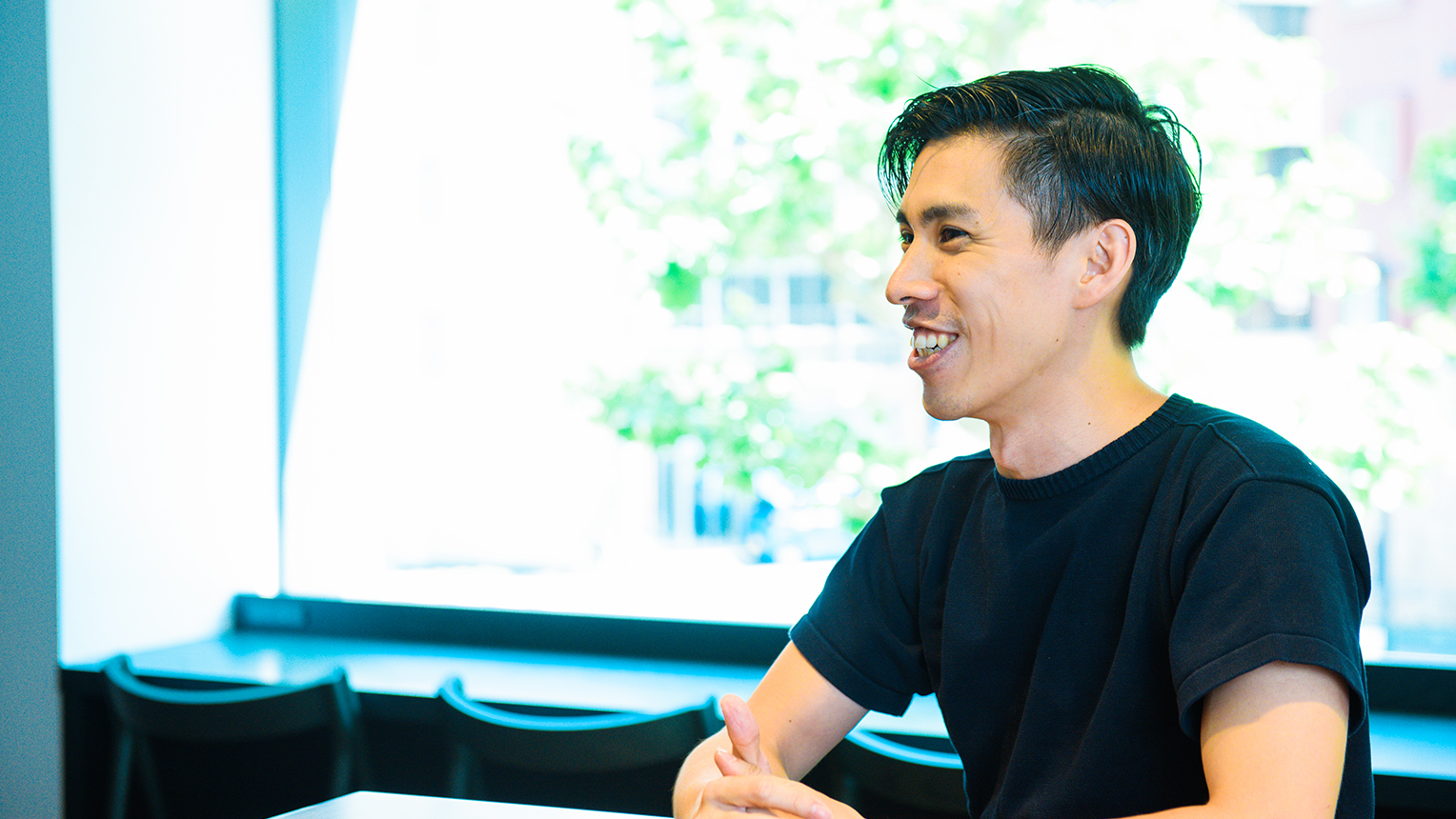
Creating a place that is not “Too-Involving” with the town.
―Mr. Takeda, you have been creating a community centered around creators, but what are your thoughts on being involved in the town community?
Although through our business we have been able to attract people starting with the fashion industry to the Yokoyamacho and Bakurocho areas and have gained the attention of the townspeople, personally I’m trying to not be “too involved with the town.” My focus is not especially on invigorating a town, but is rather more towards simply gathering creators I find interesting, and providing the appropriate place for them to have fun. If you begin thinking in terms of a town, there is going to be more consensus building required, and I personally think anything beyond that is average at best.

External view of the LOGS building located in Nihonbashi-Yokoyamacho
―Are you conscious about building a future for the clothing wholesale industry that have been continuing in Yokoyamacho and Bakurocho?
Honestly, no. For example, if this was a town famous for Japanese confectionary, maybe there is reason and purpose for keeping that recipe alive for the future. But wholesale stores are just a function of business, and should change with the times. However I do want to preserve this town with its old-timey feeling and authentic stores. Many of the wholesale stores around here have the upper floors of the narrow and long buildings serving as their warehouse. But due to changing times, many no longer need inventory and there are a lot of buildings with vacant upper floors. That is why we made the upper floors of our building into share-offices, and would be interesting if we can attract creators to the upper floors of other wholesale stores to rebuild as a high-rise city. I previously proposed this idea, but the reality was that there was no person willing to agree to that one...
―Moving forward, please tell us what you want to do in this town.
The reason I’ve committed to this town is the same for why I am involved in fashion. My family and the company all resides here. And as a result of focusing and placing importance on interacting with people who wants to invigorate this town where my family resides, I now find myself managing a hotel of all things (laughs). I can’t say that I’ve always had feelings towards this town, but due to things just naturally going the way it is now, I feel is great for both myself and the company. I still don’t have an exact idea about what I want to do in terms of a town, but I do want to build something special and never-seen-before in at least one corner of the town. And if those places could work together, people would come together naturally, then that is all that I could hope for. Anything beyond that, the people of the town are free to do so as they please, and with more and more people like that coming in, I think the town will change.

Interview and Article: Yuuki Harada / Photos: Daisuke Okamura
LOGS Inc.
Established in 2016 as a subsidiary wholly owned by “Marutaya,” a long-standing wholesaler in Nihonbashi-Yokoyamacho.In addition to the wholesale business of fashion goods such as hats and stoles at “Newcaneno,” they manage a share house for creators and enterprises in the fashion industry to gather and interact, as well as holding seminars. They also operate as an OEM manufacturer of clothing and fashion goods, as well as conducting licensing business of overseas brands and providing marketing support.



